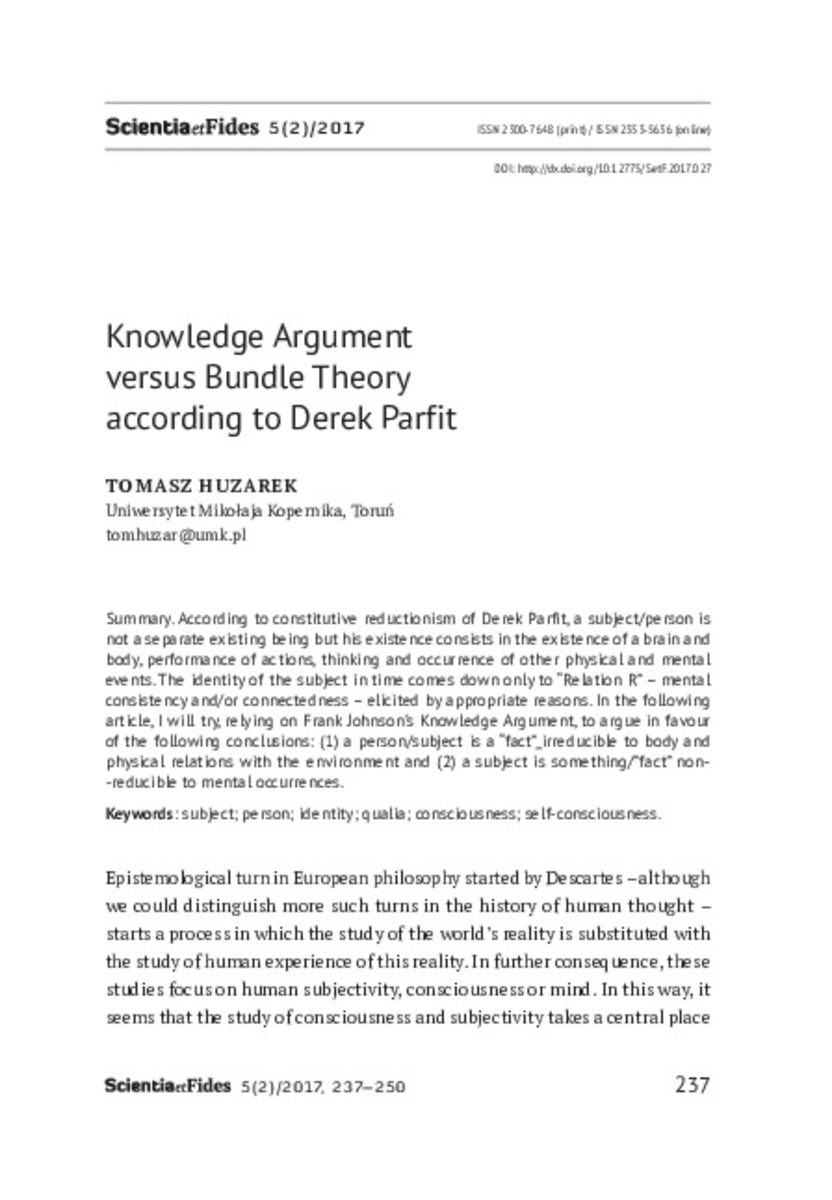Registro completo de metadatos
| Campo DC | Valor | Lengua/Idioma |
|---|---|---|
| dc.creator | Huzarek, T. (Tomasz) | - |
| dc.date.accessioned | 2017-10-11T08:41:33Z | - |
| dc.date.available | 2017-10-11T08:41:33Z | - |
| dc.date.issued | 2017 | - |
| dc.identifier.citation | Huzarek, T. (Tomasz). "Knowledge Argument versus Bundle Theory according to Derek Parfit". Scientia et Fides. 5 (2), 2017, 237 - 250 | es |
| dc.identifier.issn | 2353-5636 | - |
| dc.identifier.uri | https://hdl.handle.net/10171/44017 | - |
| dc.description.abstract | According to constitutive reductionism of Derek Parfit, a subject/person is not a separate existing being but his existence consists in the existence of a brain and body, performance of actions, thinking and occurrence of other physical and mental events. The identity of the subject in time comes down only to “Relation R” - mental consistency and/or connectedness – elicited by appropriate reasons. In the following article, I will try, relying on Frank Johnson's Knowledge Argument, to argue in favour of the following conclusions: (1) a person/subject is a “fact”irreducible to body and physical relations with the environment and (2) a subject is something/”fact” non-reducible to mental occurrences. | es_ES |
| dc.language.iso | eng | es_ES |
| dc.publisher | Servicio de Publicaciones de la Universidad de Navarra | es_ES |
| dc.rights | info:eu-repo/semantics/openAccess | es_ES |
| dc.subject | subject | es_ES |
| dc.subject | person | es_ES |
| dc.subject | identity | es_ES |
| dc.subject | qualia | es_ES |
| dc.subject | consciousness | es_ES |
| dc.subject | self-consciousness | es_ES |
| dc.title | Knowledge Argument versus Bundle Theory according to Derek Parfit | es_ES |
| dc.type | info:eu-repo/semantics/article | es_ES |
| dadun.citation.endingPage | 250 | es_ES |
| dadun.citation.number | 2 | es_ES |
| dadun.citation.publicationName | Scientia et Fides | es_ES |
| dadun.citation.startingPage | 237 | es_ES |
| dadun.citation.volume | 5 | es_ES |
Ficheros en este ítem:
Estadísticas e impacto
Los ítems de Dadun están protegidos por copyright, con todos los derechos reservados, a menos que se indique lo contrario.






